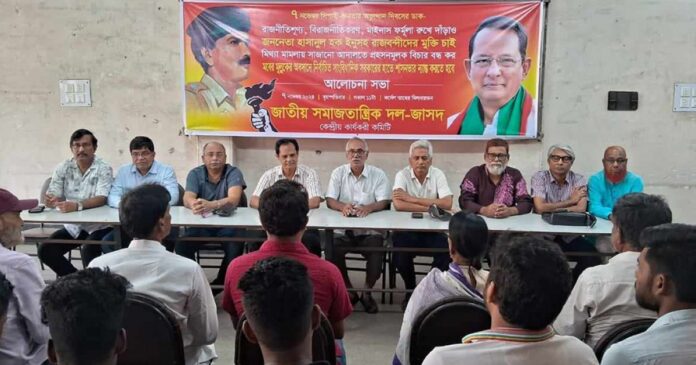To commemorate the historical event of Sepoy-Janata coup of November 7, 1975, a discussion meeting was held at Shaheed Colonel Taher Auditorium on Thursday (November 7) at 11 am on the initiative of Jatiya Samajtantrik Dal-Jasad Central Executive Committee.
Jasad Central Executive Committee vice-president Birmuktijoddha Shafiuddin Mollah presided over and joint general secretary Mirza Md. Afzal Hossain Khan Joki, joint general secretary of the party, Shaukat Raihan, joint general secretary, Naimul Ahsan Jewel, joint general secretary, Mohammad Mohsin, joint general secretary, Obaidur Rahman Chunnu, Jatiya Sramik Jot-Bangladesh spoke in the discussion meeting moderated by Anwarul Haque. President Virmuktijoddha Saifuzzaman Badsha, President of Jatiya Jubo Jot Shariful Kabir Swapan, President of Dhaka Metropolitan Jasd Haji Idris Bepari, Jasd Central Committee member Kazi Saimul Haque, Bangladesh Chhatra League (Scientific Socialism) Central Parliament President Rashidul Haque Nani and others.
The speakers in the discussion meeting paid tribute to Colonel Abu Taher Bir Uttam, the revolutionary of the Sepoy-Janata uprising, who died in the Liberation War, and said that on the one hand, as the Sepoy-Janata uprising has been recorded as a unique event in the history of Bangladesh politics, on the other hand, with the Sepoy-Janata coup, with the revolutionary Sepoys. The execution of Colonel Abu Taher, the hero of Sepoy-coup, and the long-term imprisonment of Jasad leaders Major Jalil, ASM Abdur Rab, Hasanul Haque Inu, in a farcical trial in a false case in a military court framed by betrayal, are considered as scandalous chapters of treason.
The speakers said that efforts are being made to depoliticize the country, depoliticize and implement minus formula. The speakers demanded the unconditional release of all the prisoners, including Jasad President Public Leader Hasanul Haque Inu, and an end to farcical trials in the courts organized in false cases filed in the name of political leaders.
The speakers described the current situation of the country as a mob and said that there is no alternative to entrust the governance of the country to the elected representatives and the elected constitutional government to end the ongoing political vacuum and governance vacuum in the country.

